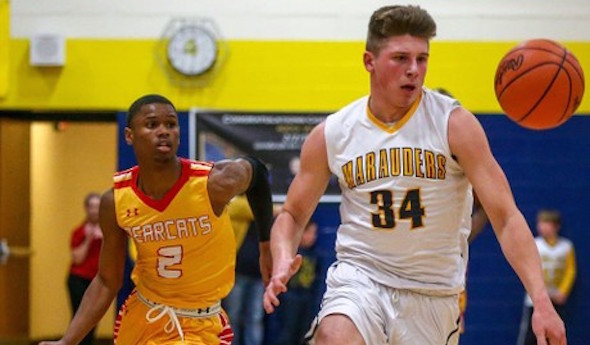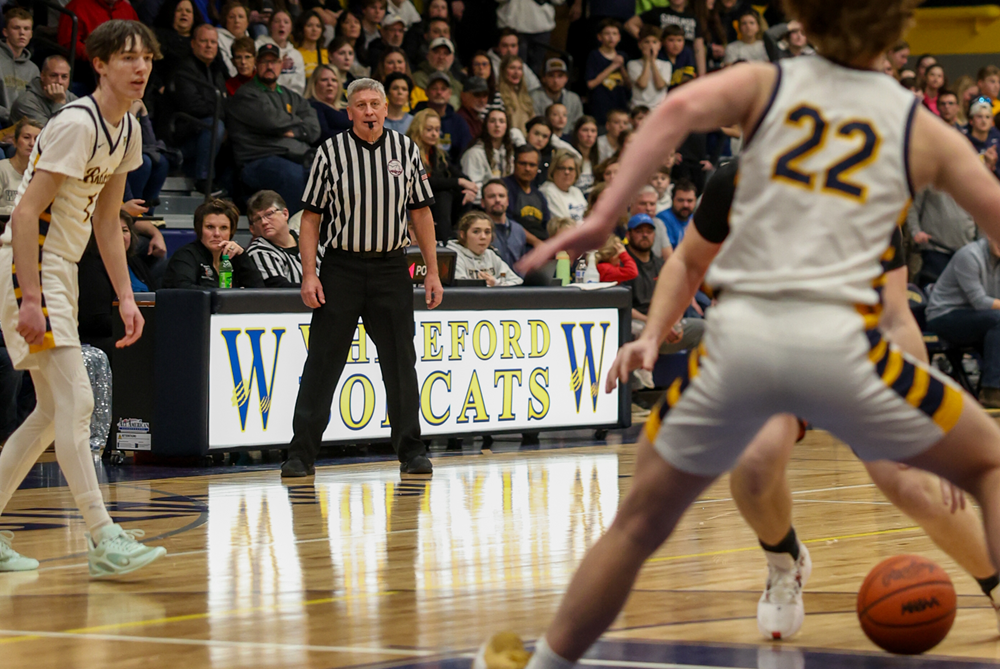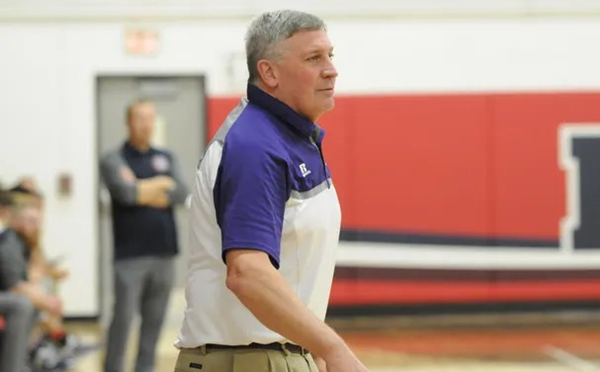
Broken Wrist Doesn't Break Season
March 29, 2018
By Geoff Kimmerly
Second Half editor
Never has a basketball player looked forward this much to shooting an airball.
 That’s what Carson Vincent is expecting two months from now, when he gets to fire with his right hand again, just like he has most of his life – until breaking a bone in his right wrist during a 7 on 7 football drill at the end of last summer.
That’s what Carson Vincent is expecting two months from now, when he gets to fire with his right hand again, just like he has most of his life – until breaking a bone in his right wrist during a 7 on 7 football drill at the end of last summer.
It’s incredible how much would’ve been lost if the Ovid-Elsie senior hadn’t been unknowingly tough and uncommonly flexible.
Vincent played a full season of football not knowing how badly he’d injured his wrist. Once he learned of the break in late November, he decided to play on – learning to shoot with his left hand and finishing his career as the Marauders’ second-leading score all-time while leading them to their best season in 25 years.
And the 6-foot-5 forward saw a clear parallel in the shared team and individual successes.
“It’s the same answer for both,” Vincent said. “Individually I wasn’t doing it for me; I was doing it for the team. I knew they wanted me out there, my family wanted me to be out there, and I wanted to be part of everything.
“The reason the team did well is we all wanted each other to be successful, to win a championship, to see each other happy.”
Ovid-Elsie finished 18-5 this winter, first in the Tri-Valley Conference West and as a Class B District champion. The league title was the program’s first since 1984, and the District its first since 1994.
Individually, Vincent began the winter coming off an all-state season as a junior, when he averaged 17.7 points and eight rebounds per game and set a school record for field goal percentage at 60.8.
With only 20 percent mobility in his dominant right hand, he was forced to become ambidextrous. “Amazingly” – to agree with coach Josh Latz’ description – Vincent upped his scoring to 20.4 points per game, grabbed 7.7 rebounds and added 2.1 assists, a block and a steal per game – and broke his school record by making 62 percent of his shots from the floor.
Vincent learned to shoot free throws left handed and became a better ball handler as well. Despite being able to throw up only an occasional floater right-handed, he became the third 1,000-point scorer in school history and finished with 1,026 points, 441 rebounds, 86 blocks, 74 assists and 60 steals over a three-year varsity career.
“Carson's toughness and resiliency this season was incredible. To be able to accomplish the things he did individually, with the hand he was dealt is remarkable,” Latz said.
“His biggest growth was as a teammate with his unselfishness to put teammates and team success ahead of his health and well-being. That being said, the successes we had as a team were in direct correlation with Carson's leadership and the example of physical and mental toughness he set for us.”
Vincent knew exactly when he was injured. He caught a touchdown pass running backward during that 7 on 7 about a week before the start of practice at the end of summer, and he fell – catching himself by falling directly on the wrist.
 Despite some pain, he started football practice and did all the drills. A receiver and cornerback, he noticed when he dropped some passes he’d otherwise pull in – but he still helped the football team to a 7-3 playoff season.
Despite some pain, he started football practice and did all the drills. A receiver and cornerback, he noticed when he dropped some passes he’d otherwise pull in – but he still helped the football team to a 7-3 playoff season.
On the day of the basketball team’s preseason scrimmage, he had the wrist checked out by a doctor who helps out with the Marauders. Diagnosis: broken and shifted bones. But Vincent already had made it through football season and decided to put off surgery until he could no longer manage the pain. He played in the scrimmage that day, although he couldn’t bend the wrist. He tried taping for a while, but gave up on that quickly because it just didn’t feel right.
And the difficulties didn’t come just at practice. Writing was doable but made his arm tired. Eating, even out of a bowl with a spoon, was not as easy as it would seem. Driving was a challenge for a bit. Sometimes he couldn’t open a door. He couldn’t shake people’s hands.
“Sometimes I’d get down on myself. Sometimes it’s frustrating,” Vincent said. “Before I went to the doctor’s office, I knew something was wrong with it – I wasn’t numb to the fact. Once I got told, obviously it was upsetting. All the what-ifs happen – what happens if I fall on it, will I be able to play, what if the pain is too much one day? It was really sad, but I got through it. I took it one day at a time. I wasn’t thinking about a week from now. I just got through what I could.”
He did sit out some parts of practice. Latz would pull him out of games to be cautious, but Vincent would ask right back in. A few opponents knew because they were Vincent’s friends, but mostly the team kept the injury an internal secret.
The Marauders’ season ended in a Regional Semifinal loss to Bridgeport on March 12, and three days later Vincent had surgery that included inserting bone from elsewhere in his arm and putting in a screw to hold everything together.
He’s wearing a cast now, and will switch to a splint in four weeks. He’s missing his track team’s first three meets, but will return after spring break next week – he runs the 200, 400 and on the 800 and 1,600 relays.
He’s planning to play college basketball. He has Division III opportunities and could also play at the junior college level to start out. Wherever he ends up, he’ll bring a much more well-rounded game – a lot of good that came out of what could’ve been a sad situation.
“First of all, (even without hurting) my wrist, if someone would’ve asked me if my team would do this, I would’ve told them I honestly don’t know,” Vincent said. “That alone surprised me. … It’s all shocking to me, to be able to do as good as a team, and I was able to do good individually also.
“Before this I was good left-handed, but I easily could say right-handed I was better. Now, honestly, my left hand is better than my right hand. I’ve learned new moves, I can do right and left hand now. Obviously I wish I hadn’t broken my wrist. But there were a lot of benefits to my game. I’ll take the good things and move on from it.”
 Geoff Kimmerly joined the MHSAA as its Media & Content Coordinator in Sept. 2011 after 12 years as Prep Sports Editor of the Lansing State Journal. He has served as Editor of Second Half since its creation in Jan. 2012. Contact him at [email protected] with story ideas for the Barry, Eaton, Ingham, Livingston, Ionia, Clinton, Shiawassee, Gratiot, Isabella, Clare and Montcalm counties.
Geoff Kimmerly joined the MHSAA as its Media & Content Coordinator in Sept. 2011 after 12 years as Prep Sports Editor of the Lansing State Journal. He has served as Editor of Second Half since its creation in Jan. 2012. Contact him at [email protected] with story ideas for the Barry, Eaton, Ingham, Livingston, Ionia, Clinton, Shiawassee, Gratiot, Isabella, Clare and Montcalm counties.
PHOTOS: (Top) Carson Vincent chases down a loose ball against Bridgeport this season. (Middle) Vincent throws down a dunk against Ithaca. (Photos courtesy of the Ovid-Elsie boys basketball program.)

Sullivan Returns to Court After Coaching, Sees Game In New Ways as Official
By
Doug Donnelly
Special for MHSAA.com
February 6, 2024
Gary Sullivan is getting a whole new perspective on basketball.
 After 25 years of coaching the game on several levels – including the last six as the boys varsity coach at Blissfield Community Schools – Sullivan has replaced his school logo with stripes and a whistle. He’s enjoying his second basketball career, this time as a referee.
After 25 years of coaching the game on several levels – including the last six as the boys varsity coach at Blissfield Community Schools – Sullivan has replaced his school logo with stripes and a whistle. He’s enjoying his second basketball career, this time as a referee.
“I’m having a good time,” said Sullivan, who will retire this month as a teacher at Blissfield. “I’ve had fantastic experiences so far. I hope it stays that way.”
Sullivan is an Ohio native, having grown up just across the state line and attended Evergreen High School. After graduating from the University of Toledo, he landed a teaching job at Blissfield. Early on, he took a stab at officiating basketball.
“(Former Blissfield baseball coach) Larry Tuttle got me into it,” he said. “I did a few middle school and some junior varsity games. Then, when I became an athletic director pretty early in my career, I gave officiating up.”
He started coaching along the way, from youth sports to middle school basketball. He took over as the Blissfield varsity coach in 2016-17
After winning seven games over two seasons with an experienced roster, Blissfield rebounded with 12 wins in 2018-19 and 19 in 2019-20 – the most for Blissfield since 1992.
The Royals won Lenawee County Athletic Association and Division 2 District titles in 2021. The LCAA title was the first for the Royals since 2003, and the District championship was the first for the school since 2004. He won 60 games in all and earned two county Coach of the Year awards.
He stepped down as basketball coach two years ago.
It wasn’t long and he was being courted to help tackle the referee shortage in Michigan and across the country. His brother, Terry, is a basketball official in the Jackson area.
“When I was finished coaching, I started thinking about it again,” Sullivan said. “My brother does a ton of officiating in the Jackson area. He told me, ‘Just do it. It will be fun. What else are you going to do in the middle of the winter? You might as well referee.’ It gives you a chance to still be involved in the game.”
Initially, Sullivan figured he’d officiate a few middle school and junior varsity games. Once he got his feet wet and adjusted to life with the whistle, however, he was hooked.
 “Last year was my first year – that was my intention, do middle school and some JV, maybe a couple of days a week,” he said. “Before I knew it, they were assigning me games left and right. The more I did it, the more I liked it. By the end of the year, they had the chance to assign a couple of varsity games. No one complained too awful bad, and they gave me a few more.”
“Last year was my first year – that was my intention, do middle school and some JV, maybe a couple of days a week,” he said. “Before I knew it, they were assigning me games left and right. The more I did it, the more I liked it. By the end of the year, they had the chance to assign a couple of varsity games. No one complained too awful bad, and they gave me a few more.”
With his basketball background, Sullivan found being a referee an outlet for his competitive nature.
“Being around basketball has made it much easier for me than someone who just comes in and, ‘Hey, I’ll try to do this,’ he said. “You are competing with yourself a little to make the right call and keep the game flowing along.”
There have been a few unexpected moments in the transition from coach to referee.
For one, Sullivan said, being on the court is a completely different perspective than being on the sidelines.
“It is so much faster when you have to run and follow that person than it is when you sit there and watch it,” Sullivan said. “When you have to run, get to your primary spot, then keep the peripheral vision going to watch everything, it's much faster, more difficult than I ever anticipated.”
Sullivan said certain aspects of the game are different, too.
“As a coach, I always anticipated what I thought was going to happen,” he said. “In your mind you know someone is going to travel, then as soon as they travel, you are yelling ‘Travel!’ As an official, it is better to be a second late and be correct than a second early and be wrong.
“To me, the toughest transition has been to slow down, wait for the actual play to let itself run its course. Make sure it really was a foul. Think about it. Don’t get in a rush to make the call.”
He’s grateful to other area officials who have helped him learn the tricks of the trade during either formal training sessions or by example. He’s had the chance to review some of his games on film, which has helped him dissect the game from a new angle. He’s also learned from coaching to block out fans and people from the crowd who might disagree with a call.
“I have not had a negative experience yet from a fan,” he said. “As a former coach, I put myself on double probation – I dished out enough that maybe I’m a little more tolerant than some other officials. That’s just my personality at this point.”
This year Sullivan has had a full schedule of middle school games plus about a dozen girls varsity basketball games and a handful of boys varsity games. The most recent was Friday in Ottawa Lake in front of a big crowd watching rivals Whiteford and Summerfield.
“That was a ton of fun – full house, competitive game. I was glad to be a part of it,” Sullivan said.
There’s another bonus to being an official. When the game is over, he can go home and sleep. No more late nights watching film or scouting for the upcoming opponent.
“My cats are much happier,” he said. “I’m not waking up at 4:30 in the morning and watching a film, then going back to bed. It’s fun. I’m enjoying it.”
 Doug Donnelly has served as a sports and news reporter and city editor over 25 years, writing for the Daily Chief-Union in Upper Sandusky, Ohio from 1992-1995, the Monroe Evening News from 1995-2012 and the Adrian Daily Telegram since 2013. He's also written a book on high school basketball in Monroe County and compiles record books for various schools in southeast Michigan. E-mail him at [email protected] with story ideas for Jackson, Washtenaw, Hillsdale, Lenawee and Monroe counties.
Doug Donnelly has served as a sports and news reporter and city editor over 25 years, writing for the Daily Chief-Union in Upper Sandusky, Ohio from 1992-1995, the Monroe Evening News from 1995-2012 and the Adrian Daily Telegram since 2013. He's also written a book on high school basketball in Monroe County and compiles record books for various schools in southeast Michigan. E-mail him at [email protected] with story ideas for Jackson, Washtenaw, Hillsdale, Lenawee and Monroe counties.
PHOTOS (Top) Official Gary Sullivan monitors the action while working a boys basketball game at Ottawa Lake Whiteford. (Middle) Sullivan directs his team from the sideline during his tenure as Blissfield’s boys basketball coach. (Top photo by Mike Doughty; middle photo courtesy of the Adrian Daily Telegram.)

